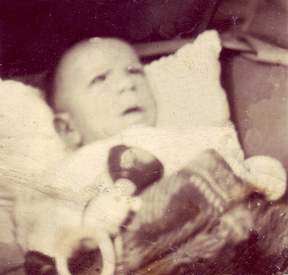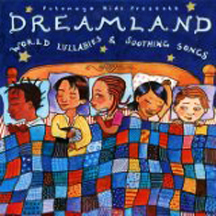Share |
Music: Rest and Relaxation through Music
By Frank Behrens
ART TIMES July/ August 2012
 The Author, before he heard a note of Mozart. |
Some time ago, there was an advertising gimmick that said “Mozart will make babies smart.” What about Vivaldi largo movements? What about Elizabethan dances? What about 12-tone music, which is by no means pleasurable but is highly intellectual? Should that make a baby smarter? Of course, the Mozart-smart connection was total nonsense. But what if we just consider music to help a baby sleep?
If a child can sleep with heavy metal blasting in the next room, or in the baby’s room, good luck to it. It might grow up as a nervous wreck; but at least as an adult it might be able to sleep with any kind of noise going on. (I live in New Hampshire and am kept awake if there is a drippy faucet in Detroit. I think my mother gave me too much quiet when I was a tiny tot.)
Let us agree that soothing music is probably best for inducing sleep, not only for babies but for anybody who cannot sleep even in total silence or with normal ambient noises. On the other hand, a baby wailing next door or a set of spouses at it hammer and tongs most of the night might be normal for apartment house living, but I suspect that no one can ever really learn to ignore that. Perhaps playing Sousa marches at top volume would block out those sounds and incur the wrath of those very neighbors who see courtesy as only a one-way street.
So given a tolerable acoustic environment, what sort of music is best for relaxation during the day and sleep during the night?
I just pulled out of my collection one of those old Readers Digest sets that used to be on LPs and then were put onto CDs before disappearing altogether, except at garage sales. The title “Soft ‘n’ Sentimental” looks promising. The orchestral halves of some selections are certainly capable of setting a calm mood: “Where or when,” “Stairway to the Stars,” “Love walked in,” “Laura,” and especially “In the still of the night.” I have some doubts about “Linda,” “It’s only a paper moon,” and “Tuxedo Junction.” Well, one can but test them and try.
 |
Now a friendly little record company named Putumayo Kids has put a lot of effort into producing CDs filled with gentle music “for bedtime, relaxing and sweet dreams,” a phrase culled from the jacket of one of three of their CDs. They are designed for listeners of all ages and so are the perfect examples of dealing with sleep deprivation.
Two of them are vocal: “Acoustic Dreamland” and “African Dreamland.” The third is titled “Instrumental Dreamland.” The first has 11 selections from as many composer-singers; and some of the titles are “Dreamland,” “My darling,” “The hour of sleep,” and “Next time.” The second disc has 11 songs from South Africa, the Congo, Cameroon, and Mali (among other locales).
Yes, they are indeed conducive to relaxation at the least, sleep at the best. But I find when I use music to put me under, if there are vocals I keep concentrating on the words if they are in English. So for me, the African set would work better than the first one. For a tiny tot, however, words would be just part of the music and no problem.
It follows then, that “Instrumental Dreamworld” would work best for young and old. Again there are 11 selections drawn from the music of the USA, Brazil, Japan, and Mali. This is the one I would vote for, given my needs.
I might add here my pet peeve is about restaurants that insist on blasting vocal music for the pleasure of those who came to have a quiet meal. Whenever they turn up the volume, I strongly suggest they turn it down, as such music (indeed any music played too loudly) is not conducive to relaxed dining. Perhaps I should ask them to play “Instrumental Dreamland” instead!
The reader can visit the website at putumayokids.com for more details and some music to sample.
Those who can transfer music to their computers can easily make up their own list of selections onto ITunes, as I have done. And if they find “The Overture 1812” or the Triumphal scene from “Aida” conducive to sleep, fine for them.
But the original question still lingers. Since I do hear a lot of Mozart in my home, is there even the slightest chance that I getting any smarter? At my age, it is hard to tell.
Frank Behrens: fbehrens@ne.rr.com
